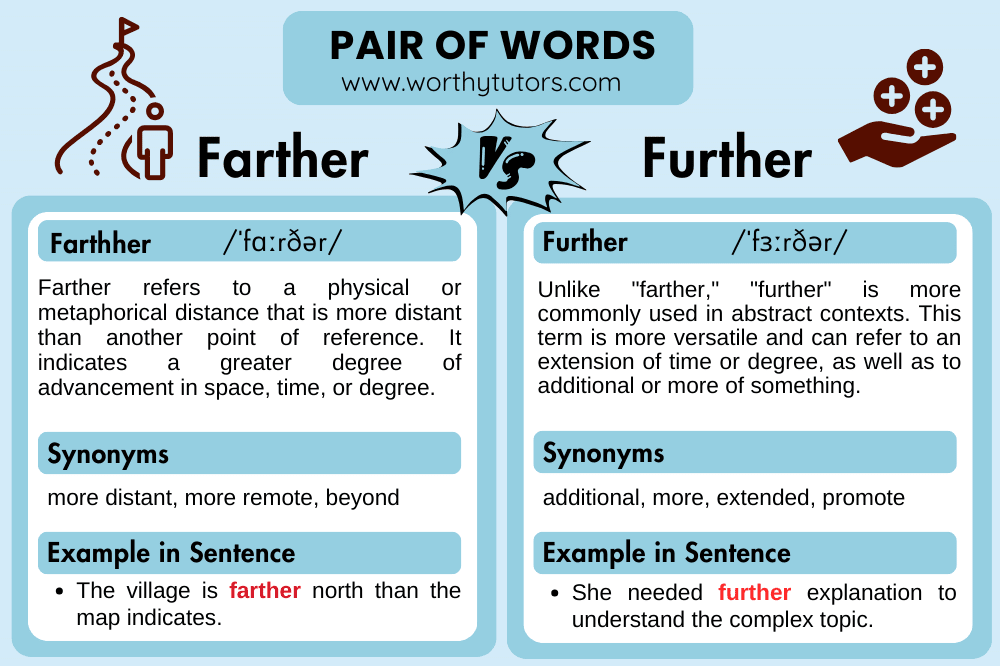
Differences Between Farther and Further
The words “farther” and “further” are often used interchangeably in the English language, but they have distinct nuances that can change the meaning of a sentence. Both words are comparative forms of “far,” but “farther” typically refers to physical distance, while “further” is used for metaphorical or figurative distance. This article will explore these terms in depth, providing clarity on their pronunciation, synonyms, meanings, usage, and examples.
Farther
Pronunciation of Farther
Farther: (fahr-thər) /ˈfɑːrðər/
Meaning of Farther
Farther refers to a physical or metaphorical distance that is more distant than another point of reference. It indicates a greater degree of advancement in space, time, or degree.
Synonyms of Farther
Synonyms include: more distant, more remote, beyond, more advanced.
Etymology and Explanation of Farther
The word “farther” originated from Middle English, deriving from the combination of the words “far” and “-ther,” which denotes a comparative degree. It is commonly used when discussing literal distances, such as how much farther one must travel to reach a destination. This term is associated with physical space and distance. It is used when measuring the extent to which one object or place is more distant from another.
Example of Farther in Sentences
- He walked farther into the forest, hoping to find a hidden clearing.
- The mountain peak seemed farther away than they had anticipated.
- She could throw the ball farther than anyone else on the team.
- The village is farther north than the map indicates.
- He walked farther into the forest to find the lost dog.
Further
Pronunciation of Further
Further (fur-thər): /ˈfɜːrðər/
Meaning of Further
Further typically signifies advancement, progress, or addition in a non-physical sense. It denotes the extension of a concept, idea, or action.
Etymology and Explanation of Further
“Further” has its roots in Old English and shares a common origin with the word “forth,” implying onward movement. Unlike “farther,” “further” is more commonly used in abstract contexts, such as furthering one’s education or furthering a discussion. This term is more versatile and can refer to an extension of time or degree, as well as to additional or more of something. It is also used to indicate a continuation or advancement in discussion or analysis.
Synonyms of Further
Synonyms include: additional, more, extended, promote.
Example of Further in Sentences
- She needed further explanation to understand the complex topic.
- Can you provide further details on how the project will be executed?
- The investigation will not proceed any further without new evidence.
- She decided to look further into the history of the building.
- Can we discuss this matter further at the next meeting?
Summary
While “farther” and “further” are often used interchangeably, they serve different purposes. “Farther” is the preferred choice when referring to physical distance, whereas “further” is suitable for abstract measures such as time, quantity, or degree. Understanding the distinction between these two words is important for precise communication and writing.
Fill in the Blank Exercise on Farther and Further
- He wants to explore ______ into the unknown territories.
- We need to discuss the matter ______ before making a decision.
- The summit was much ______ than they anticipated.
- Please provide ______ information on the topic.

About Authoress
Mahnoor Jehangir is a seasoned educator and linguist, specializing in English language and literature. With a master’s degree in English and applied linguistics, Mahnoor serves as a subject lead, while also indulging her passion for writing, exploring the nuances of language and storytelling.